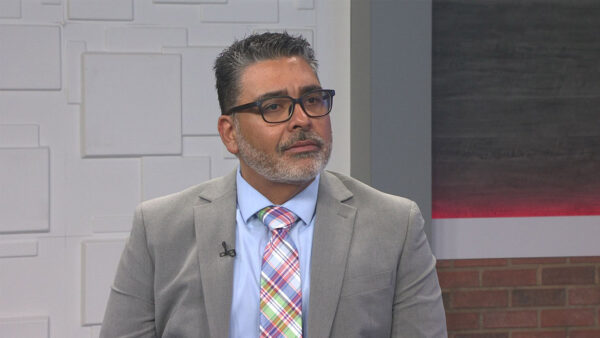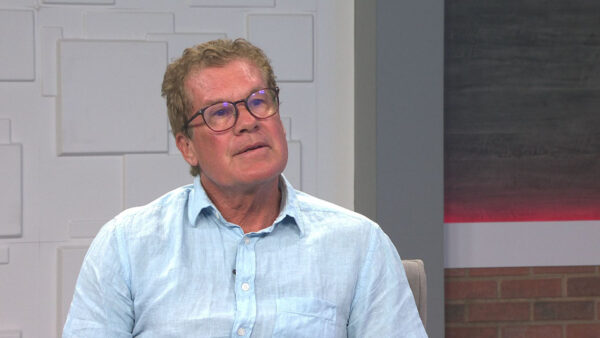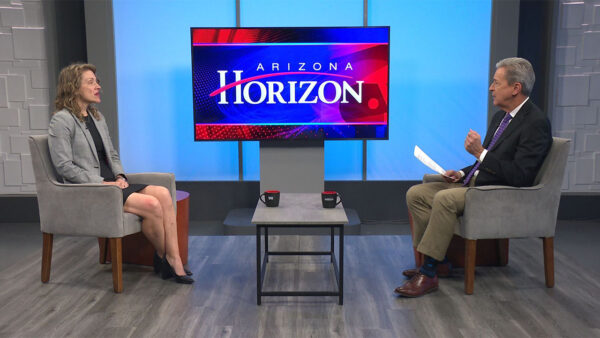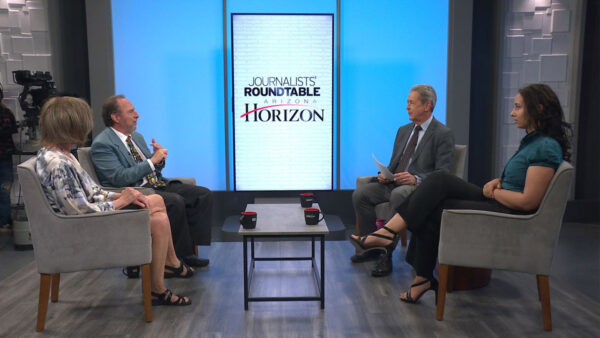The legislative session wrapped up with the Republican-controlled legislature approving the Democratic budget. Hear what Governor Janet Napolitano has to say about the budget and bills passed by the legislature this session in her monthly appearance on HORIZON.
>>Ted Simons:
Tonight on Horizon: a big win on the budget for the governor and Democrats in a Republican-controlled legislature. But Republicans do manage to pass a measure that puts same-sex marriage on the ballot and the wildfire season hasn't been bad so far yet, but it's still far from over. The governor will talk about those issues and more, coming up next, on Horizon.
>>Announcer:
Horizon is made possible by contributions from the friends of Eight, members of your Arizona PBS station. Thank you.
>>Ted Simons:
Hello and welcome to Horizon, I'm Ted Simons. The recently-ended legislative session went down to the wire as a budget was approved just days before the deadline, but not before things got nasty in a debate over same-sex marriage. Here to talk about that and many other issues the legislature dealt with this past session is Arizona Governor Janet Napolitano, who visits our set monthly.
>>Ted Simons:
Governor, good to see you again. Thanks for joining us.
>>Janet Napolitano:
Well, thank you.
>>Ted Simons:
Let's start on the wide angle and take it in from there. Overall session, what kind of concentration on the budget? Biggest success. What you're most proud of?
>>Janet Napolitano:
I think the budget. The fix of the '08 and '09 budget. It was difficult. We had to cut literally $3 billion out of the two years together and do so in such a fashion that we don't prejudice ourselves as Arizona comes out of this economic downturn. And it was hard. There were a lot of ideological lines in the sand that had to be drawn early in the session that had to be overcome. And the '09 portion came down to the wire.
>>Ted Simons:
Biggest disappointment?
>>Janet Napolitano:
I'm disappointed that we didn't finish the energy bill. It was moving through very well. It's a bill that focuses on renewable energy, which obviously is going to be a big need for Arizona in the future. But it's a big topic. And it was really the first time the legislature had taken up an omnibus energy bill that included things like renewable energy. So we'll go back at it next year.
>>Ted Simons:
I was going to say some suggested you didn't push as hard as they may have expected on solar energy. A fair criticism?
>>Janet Napolitano:
Not a fair criticism. We were pushing very hard. But in the end you got to bring it to the floor and have the votes. And at the end of the session it just wasn't there. So like I said, we'll go back. We'll go back. We'll retool. We'll get reinvigorated. It's a topic that's not going away.
>>Ted Simons:
It's also something that looks as though Arizona -- maybe this is perception only -- Arizona is missing out on some projects that are going to Oregon of all places along with Oklahoma and New Mexico and these kinds of things. How concerned are you about that?
>>Janet Napolitano:
Somewhat concerned. But I must say this is a very new industry and there are lots of new technologies under the rubric of solar that are being tried out there. What we have missed out are the standard tried and true ones. But the new things coming forward in solar, they haven't found a home yet. There is still time for Arizona to play the leading role we should. The line I've always use said we should be the Persian Gulf of Solar. We can get there but we're going to need some help from the legislature next year. But even in the meantime, there are big projects underway. Indeed just today I signed a bill that provides a property tax incentive for utility companies that use solar. And that will be used by among other companies APS in a big solar project with a Spanish solar company called Avongoa.
>>Ted Simons:
Let's get back to the budget here. I'm hearing on one side this was a bipartisan budget and I'm also hearing Republicans saying it wasn't bipartisan at all. Did the two sides work -- [laughter]
>>Janet Napolitano:
Well, you had Republicans and Democrats vote for it. I think it's bipartisan.
>>Ted Simons:
Yeah. Most Republicans, though, didn't. Was there a better dynamic, do you think, between both parties this go around than in previous sessions?
>>Janet Napolitano:
If anything it was more difficult. You had more members of the House and the Senate basically says they were not interested in voting for any budget. And they kind of took themselves out of the budget process. And since you need 16 and 31, it really changed that dynamic. There has always been in the Arizona legislature a middle ground. The problem has been having leadership recognize that that's where the majority of the votes are. And to get there we had to have all the Democrats on one side as they were.
>>Ted Simons:
Okay. The critics, though, are saying borrowing, fiscal maneuvers, these sorts of things that it just worsens the fiscal outlook. Respond.
>>Janet Napolitano:
They're just wrong. We're not borrowing irresponsibly. We're bonding for school construction and university construction. These are buildings. We're not borrowing for operational expenses. We swept funds. We cut expenditures. But we made important decisions. We decided we weren't going to cut K-12 expenses, we decided we weren't going to pay for more Child Protection Services workers, we decided we were going to keep building a new medical school in phoenix and we could do that within a sound fiscal framework. That's exactly what the '09 budget achieves.
>>Ted Simons:
Is there a concern, though, that some of the ways that the budget was worked around, some of these maneuvers, if you will, some of the tools in the tool box, have they been used up this year? What happens next?
>>Janet Napolitano:
Obviously we don't have the Rainy Day Fund next year. We have exhausted that 750 million, which we've probably got a little bit left but bulk of its gone. But on the other hand, the QTR Tax Suspension is over. Population growth continues. We're starting to see a little bit of volatility, a little bit of vitality in some of the numbers. So we're going to keep managing our way through this. If we have to go back in and adjust this budget during the fiscal year, you know, remember in the '02-'03 budget we had six special sessions to adjust it as the economy went on. We've been there before. We know how to do. This and we'll do what makes sense for Arizona.
>>Ted Simons:
Are you expecting a special session?
>>Janet Napolitano:
It wouldn't surprise me. I'll think it's reasonably foreseeable we'll have one if not two special sessions on the budget, just because the economists are in disagreement, the numbers seem volatile. We know pretty well where Arizona is, but the national economy and the world economy are so, you know, on and off, it seems that that will have an impact on us as well.
>>Ted Simons:
I've seen the numbers and they kind of come and go. But last one I saw was 800 million in terms of a deficit between revenues and operating expenses. First of all, is that --
>>Janet Napolitano:
For what?
>>Ted Simons:
For the budget, for from here on out for where it goes from here.
>>Janet Napolitano:
Oh, I don't think you can use that kind of a number. But go ahead.
>>Janet Napolitano:
Hypothetically if there were such a deficit.
>>Ted Simons:
Yes, if there were. Again, when the legislature goes back into session and when the numbers and everything start having to be crunched again, what's left? Are we looking at the possibility of a tax increase?
>>Janet Napolitano:
I don't think so. I mean, that's obviously the last thing we want to do. Unless it's something that voters approve for a specific reason, like for transportation spending. Which by the way is its own economic stimulus and a huge one for our state. That will be on the ballot in November. But there are other tools in our tool box, there are other things we have left. And I don't want to predict that. I want to say, look, we came through the toughest budget session we've ever had in Arizona. We balanced two budgets. We did it without raising taxes. We protected education, we invested in higher education, we protected safety net services, we made lots of cuts but we did them in a targeted and strategic way. We did lots of fund sweeps. Boy, have I been hearing noise about that. All over people don't like the fund sweeps. But with the choice as that or actually removing somebody from health care or cutting out domestic violence shelter beds or any of the other things that we do, the choices become pretty clear.
>>Ted Simons:
350 to 348 million in the spending cuts. Could there have been more?
>>Janet Napolitano:
Obviously there were those in the legislature who wanted, you know, the House Budget I think at one point had $1 billion worth of cuts but it was unsustainable and was never passed because it would never pass the members. They knew those kinds of cuts were not good for our state. I want to our papers and columnists saying, we should do what New Jersey did. They didn't bond and blah blah blah. Well, if our state per capita's spending were like New Jersey's we might manage our budget in terms of cuts the way they're doing. But we are so far down the road in terms of what we spend, we're a bare bones budget to begin with. So if you cut much more you're cutting -- you're cut into the lifeblood of the state and into things that legislature really has no discretion over. They are voter-mandated expenditures. So we are about as far away from New Jersey in terms of budget and budget planning as you can be.
>>Ted Simons:
Would you like to see the legislature in some way, shape or form get a little bit more control on some of these voter mandates? I mean, we understand why that was passed. Because there was too much meddling as far as what the voters wanted by way of referendum and initiative. But has it gotten too far to the other side where lawmakers' hands are tied?
>>Janet Napolitano:
Well, I think it depends on the legislature. I think that in the recent past the voters wanted to make sure that their will was being respected and carried out. And that kind of discipline was needed. And so we have under those mandates we have carried out our business. We have balanced the budget, we have moved the state forward. We're on into the next fiscal year. Off we go.
>>Ted Simons:
Okay. Education rollover real quickly here. There's some criticism on that as well. Talk on schools.
>>Janet Napolitano:
There is no impact on schools. This is an accounting mechanism that basically delays a payment by two weeks, four weeks, and six weeks. It has been used in the past by Governor Symington, and Republican governors before him. It is commonly used. And it is a rollover. So it's a very short-term thing and it keeps, like the description, it just keeps rolling over. It is an accounting mechanism. It is a fiscal bridge. Do you do it when you're flush? No. Is it a better thing to do than say, for example, to cut $300 million out of classroom spending? You bet.
>>Ted Simons:
Last question regarding the numbers aspect of the budget. For those who said more than 348 was necessary, that we're just borrowing, that we're just whistling past the graveyard, these kinds of criticisms, how do you respond? Because I know we've talked in the past where you say you need to manage your way through this and others say you need to bite the bullet. Is there no -- are there no bullets to bite?
>>Janet Napolitano:
there were bullets bitten. That's the myth here. You use the 348 number. You're totally omitting the fund sweeps. You're talking between the two fiscal years over $1 billion of cuts. And more than that in fund sweeps. There was a lot of money taken out of a very thin budget to begin with. So don't use the 348 million number and say that's all this legislature did. They did so much more. But it was a budget that managed. I mean, it's easy just to say, we'll eliminate this, this, this, blah blah blah, without any analysis of what does that really mean for Arizona? That was not the tact taken. The tact taken was to say, what does this mean for people, for youngsters, for our seniors, for families that may be in temporary economic distress during this economic downturn? And to manage our way through that. That was the goal.
>>Ted Simons:
Okay. The photo radar cameras is also getting a lot of talk and a lot of concern. $165-
>>Janet Napolitano:
Howie Fischer's favorite program.
>>Ted Simons:
Good for Howie. $165, okay, right there. But no points. And no insurance company reporting. Are there safety concerns regarding those two aspects?
>>Janet Napolitano:
You know, we decided that let's keep it simple to start. All this program does is add 100 more photo radar cameras, mobile cameras around the state of Arizona. We're looking for a deterrent to excessive speed. And $165, I don't know about you, but for me that's a deterrent. And so that's what it was set up to do. Now, if the points, insurance part of it proves to be a problem in terms of deterrence or its maximum effectiveness we can go back in and adjust that. But I'll tell you by keeping the points out and the insurance reporting off, you keep the administrative costs of the program down. Because the assumption is, at least to begin, that many people will say, gosh, I got that ticket. I shouldn't speed. They'll write the check and go on without using core procedures. If that doesn't work, if that assumption is wrong we can go back in it's statutory. It can be adjusted.
>>Ted Simons:
For those who are against this, they're seeing some sort of a moral problem here with the idea of the state counting on people driving recklessly. Stretch?
>>Janet Napolitano:
It's not correct. Because we didn't use any revenue from photo radar in this budget. In other words, it is not counted in this budget. All that was done was to give DPS the authority to install some more cameras. But we didn't put any revenue number, include that in the actual budget. So to say that we are using this as a budget-balancing mechanism doesn't square with the facts.
>>Ted Simons:
The idea, though, of taking this money and -- again I'm trying to take the other side here.
>>Janet Napolitano:
I get you.
>>Ted Simons:
You're literally counting on folks driving recklessly to bring more coffers.
>>Janet Napolitano:
No. What we're trying to do is deter people from driving recklessly. And if that deterrent results in a fine that can be used, for example, to enhance DPS Services and manpower as we move along, so be it. But otherwise, we tax cigarettes to deter people from smoking and we use those moneys to support First Things First for preschool. There's nothing wrong inherently with that. The point to be made is that photo radar is going to be used as technology to augment the manpower that we have in the Department of Public Safety. It's here to stay. It's a small program. 100 cameras statewide. It's not huge. But hopefully large enough to deter people from speeding. Gas prices might help with that as well. And then to the extent it generates revenue, that just goes in the General Fund. But it is not counted in the '09 budget.
>>Ted Simons:
As we continue on the moral highground here, let's talk about the concept of using the lottery backing the University Renovation Plan, if you will. Are enough people going to play the lottery to really back these bonds?
>>Janet Napolitano:
Well, the economists say yes. And what they looked at is taking off some of the -- you know, the Arizona Lottery has been operating under some severe restrictions ever since it was adopted. In part because many people were opposed to the lottery. And I understand that. I mean, I can respect gambling really offends some people and the notion of the government participating in this is something that many people don't like. But we have the lottery now. But we had all these artificial limits on it. So states around us that have lotteries, we could see what they were reaping and being able to use revenues for just by having, you know, higher caps on the numbers of machines that could be used and the amount that could be spent on lottery advertising and the number of games that could be proposed. So you look at a state like Colorado. And so what the legislature did is, in order to support university growth which we know we're going to have, General Fund being a little thin saying, look, we need to build those buildings now. We need to build out that medical center in downtown Phoenix. We need to have new labs and refurbish buildings at NAU and U of A that we know we're going to need. And we think if we take some of these limits off the lottery, not totally but some, looking at what has happened in other states, you can depend on a revenue stream.
>>Ted Simons:
You mentioned not all of them but some. What about the video terminals which I know some folks have been pushing for that for awhile. Is that something you can see? I know apparently from states that have those, the video lottery business, that helps quite a bit in terms of getting people in the games.
>>Janet Napolitano:
This proposal does not include those. And that's why it went from a $1.4 billion proposal to $1 billion. We took those out, in part because there was a last-minute question raised about how that would jive with our Indian gaming compacts. And rather than get into all of the legality of that, which is very complicated, we decided just to leave it out.
>>Ted Simons:
Today's actions, you had to apparently some vetoes regarding what, HOA rules and these sorts of things. And concealed weapons as well. Could you go over those real quickly?
>>Janet Napolitano:
Well, as you know at the end of a session, all the bills that have not yet been acted on come up to me and we have a certain number of days to act on them. So I cleared the desk today. I worked through the weekend and basically we cleared the desk. And I did sign most of the bills. But I did veto a few. Two of them involved concealed weapons. Because again, I felt they were not in the interest of public safety. I didn't think that they were consistent with our existing concealed weapons law. And unfortunately one of them was part and parcel of a bill that had some other things in it that were not objectionable. But this is what has happened sometimes this session. They put a bill in, it was a concealed weapons provision. I actually had vetoed the identical thing before this session and they stuck it in the bill with some other good stuff as if daring me to change my mind and I didn't.
>>Ted Simons:
I was going to say. You get weapons bills all the time and you get abortion bills all the time.
>>Janet Napolitano:
Right.
>>Ted Simons:
Are you moving closer toward some of these ideas, or are they still just not what you're looking for in terms of legislation?
>>Janet Napolitano:
Well, I think on the weapons bills, you know, I will sign and have signed many weapons bills that I think really adhere to the spirit and the letter of the second amendment and so forth. But on concealed weapons laws, there's been just a repeated parade of bills designed in my view to vitiate the concealed weapons laws. I don't think that's good for public safety. I have vetoed those. I have indicated I will veto bills about guns on school grounds, guns in bars. The risk to public safety greatly outweighs any benefit you would get. And on the abortion bills, that's an area where I know some Arizonans disagree with me. They would like the legislature to be legislating in this arena. But in my view it's such an important decision that it really needs to be left to a woman, her husband, her partner, her spiritual counselor, church, her conscience and her physician. And the bills I have vetoed are consistent with that belief, that the last person that a woman, her husband and a doctor need to be thinking about when these difficult decisions are being made are 90 people at the legislature.
>>Ted Simons:
Ballot initiatives. We could have as many as nine for voters to look at. Which really isn't all that many compared to previous go arounds.
>>Janet Napolitano:
Yeah. It's a pretty significant lot.
>>Ted Simons:
Yes. I know the Transportation Plan is something you're very big on. Again I've asked you this before but I want to ask you again, how do you convince people in these troubled times that this is the time for that increase?
>>Janet Napolitano:
Well, there's, you know, first of all, the tax part of it doesn't even begin until 2010. It's suspended. But the initiative itself allows us to build. And building creates jobs. And we build roadways and highways and bridges and mass transit and rail from southern Arizona to northern Arizona. What a great way for all of us collectively to say, we are continuing to invest in the state of Arizona. And if that doesn't pass, we will run out of transportation money within the next 18 months to 24 months. All we will be able to do is repair what we have. And talk about something that will cost us jobs and cost us economic growth that is nothing a future we want.
>>Ted Simons:
Another couple of constitutional amendment projects here. One as we're mentioned earlier, defining marriage. First of all, your thoughts on the idea.
>>Janet Napolitano:
Well, that was the one as your intro stated, that ultimately got out of the legislature the last hours of the last day by one vote in the senate. And to me, I intend to vote against it. And I intend to vote against it not because I don't think marriage is between a man and a woman. I do. But because our courts have consistently said it's between a man and a woman. So to me to amend our constitution prophylactically is never a good idea.
>>Ted Simons:
Are you going to campaign against it?
>>Janet Napolitano:
I haven't made a decision yet.
>>Ted Simons:
What about the civil rights issue that targets Affirmative Action?
>>Janet Napolitano:
You can go to the laundry list if you want. I'm not going to be prepared tonight to talk about all the initiatives because I want to marshall my arguments. The once I've already expressed an opinion on are time, which is the Transportation Initiative. The other is state trust land reform. I think it's called Conserve Arizona's Land and Water. It will go unopposed to the ballot. It's a great measure. It conserves a 570,000 of our most scenic acres of trust land from development. It gives the land department option toss deal with other land and overall increases the value of those state trust lands in a way that accommodates our growth.
>>Ted Simons:
State department of health services director resigned. Was this something that you pushed for?
>>Janet Napolitano:
No. At the end of the session, Sue Gerard. She'd been with me six years now as a policy advisor and as department of -- director of the Department of Health Services. And decided it was the sixth year. And these are very tough jobs and what have you. It was time to make a change.
>>Ted Simons:
The problems at the veteran's home factor in that, you think?
>>Janet Napolitano:
You know, I don't know. But I do know this: I know that we have all, throughout state government, been working very hard on the V.A. Home. And we have brought in now a new director of the Department of Veterans Affairs. I thought General Maxim was doing a wonderful job there but he retired. And we recruited Colonel Strickland from Louisiana, a system that runs five homes and does it very well. We went out around the country, found somebody who I think really has a great track record. And as a career army person himself, to come in and run the department and work on the home, he's going to bring some personnel with him. So I think we're going to be making some great advances there.
>>Ted Simons:
And as far as a director for DHS., what are you looking for? What are you looking for as far as changes or improvements?
>>Janet Napolitano:
Well, to me, DHS. Is a very important public health agency, the most important public health agency. So you want somebody to run it who's a good manager, a good leader, who shares my vision for how we improve the quality of public health in Arizona, who knows the various groups. They're called stakeholders or whatever. The hospital community, the physician community, the nurses and everybody who's involved in the provision of health care. And also has knowledge, expertise and appreciation for the importance of behavioral health.
>>Ted Simons:
Last question here. Well, I was going to ask about Barack Obama but we haven't talked about fire season, have we? Are we ready for this? Have we made it past do you think the worst part?
>>Janet Napolitano:
Don't know. Probably too soon to tell. But I will say this: I think some of the work we've been doing over the past years has been paying off. Because, for example, the thinning and treatments around Crown King have really helped us keep a fire that I think several years ago would have just raced through that town away and really saved virtually all of the structures there. I think we've lost a total of seven out of 300 structures there. So those kinds of treatments, creating fire space around businesses and homes and the number of man-made starts in Arizona has gone down significantly. So our continued message that all of us share this responsibility about fire when we're in the out of doors I think is paying off.
>>Ted Simons:
Okay. Now my last question about Barack Obama.
>>Janet Napolitano:
Okay.
>>Ted Simons:
Do you think his campaign, does it seem a little complacent here of late?
>>Janet Napolitano:
Oh, I don't think so. I think first of all, they're busy raising money, as campaigns need to do, preparing for the convention. He's been on a very extensive road trip laying out in detail his economic agenda for the country. So moving far ahead.
>>Ted Simons:
You don't see a little bit of stagnation there? Because some political observers are saying things have slowed a little bit.
>>Janet Napolitano:
Well, you don't have a primary every week. And maybe that accounts for it. You're not every week or two weeks gearing up for a primary. So of a course the pace has changed as it has changed for Senator McCain. Because now you know what you have. You have the two major candidates, you have two conventions which are kind of the start of the final lap, if you wish. And then you're going to have a massive campaign in the fall with really I think the most important presidential election at least of my lifetime.
>>Ted Simons:
All right. Well, governor always a pleasure, good to see you again. Thanks for joining us.
>>Janet Napolitano:
Thank you. You bet.
>>Ted Simons:
What is the prediction for this summer's monsoon? The meteorologist-in-charge of the local region of the National Weather Service office joins me to track precipitation and talk about temperatures. That's tomorrow on Horizon.
>>Ted Simons:
That's it for now. I'm Ted Simons. You have a great evening.
Janet Napolitano:Arizona Governor;




















